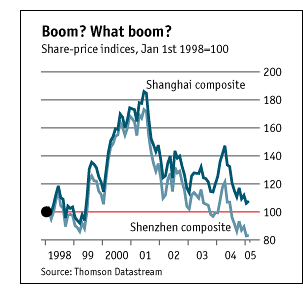

|
| weblog/wEssays | home | |
|
Is the Bloom Off the China Rose? (December 19, 2005)  Although we're not wealthy in terms of money, we are wealthy in one valuable asset:
friends around the world. Friends tell you things you will never find in statistics or
most media stories. For instance, one of our Japanese friends visited us recently
with his new bride, and we were treated to an insider's view of doing business in
Vietnam and China.
Although we're not wealthy in terms of money, we are wealthy in one valuable asset:
friends around the world. Friends tell you things you will never find in statistics or
most media stories. For instance, one of our Japanese friends visited us recently
with his new bride, and we were treated to an insider's view of doing business in
Vietnam and China.
Like many small manufacturing companies in Japan, our friend's employer has parts (in this case, steel fittings, tubing, etc.) made in various other Asian countries: China, Vietnam and Thailand. According to our friend, Japanese companies are leaving China and returning to manufacturing in Japan, for two reasons: 1) the Chinese have a habit of shirking responsibility when things don't go right, and 2) theft of technology makes it a long-term impossibility to manufacture high-value items in China. Our friend reports that all hybrid vehicles are still made in Japan, as the manufacturers cannot risk losing the complex technology to the Chinese via theft. Although the quality of parts made in Vietnam is no higher than those fabricated in China, the difference in business attitude, he says, is enormous: unlike Chinese firms, Vietnamese factories will accept responsibility for missed deliveries, unacceptable quality and the like, and make good on their commitments. If theft of technology and the shirking of commitments made for quality and delivery are not just localized issues in China, but macro-issues to be found in every province and every type of business--and our other sources inside China give us no reason to doubt the widespread nature of these issues--then the bloom may well be off the "China will boom forever" rose. If the tide of foreign capital which flooded into China recedes in favor of the home country or other Asian nations, then China's growth will likewise recede. The chart above begs the question: if things are so great in China, how come the Chinese aren't buying shares in their own public companies? * * * copyright © 2005 Charles Hugh Smith. All rights reserved in all media. I would be honored if you linked this wEssay to your site, or printed a copy for your own use. * * * |
||
| weblog/wEssays | home |